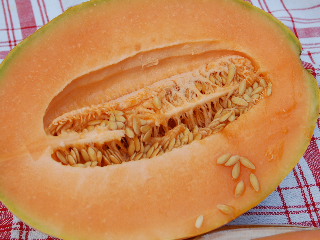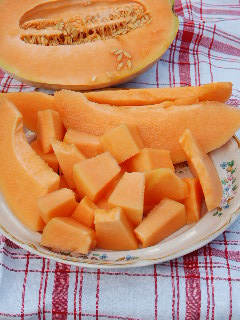
A melon by any other name would taste as sweet.
Had Shakespeare been alive and gardening in the Italian village of Cantalup in the 1700’s, this might have been his proclamation regarding that wonderfully juicy and sweet-tasting fruit, the cantaloupe, first cultivated in that locale and named for a nearby castle.
And, being the word-wizard that he was, he might have debated with the local growers and citizenry the difference between cantaloupe and muskmelon, even as we do today in identifying and discussing this healthful and delicious food.
In reality, all cantaloupes are varieties of muskmelons, and the two terms are used interchangeably in everyday speech to identify the same fruit. True European cantaloupe (Cucumis melo cantalupensis) is a lightly-ribbed fruit with a pale greenish skin. This melon is generally not exported. North American cantaloupe (Cucumis melo reticulatus) is a member of the same muskmelon species and is named for its coarser, net-like (or reticulated) skin.
However you choose to identify it, do yourself a healthy favor and try to incorporate this vitamin-rich food into your diet as often as possible. Cantaloupe is high in potassium, as well as Vitamin C and Vitamin A. Its orange flesh is a good source of beta carotene and antioxidants, which can greatly benefit the cardiovascular system and the immune system.
It is believed that eating three or more servings per day of fruit, especially fresh fruit like cantaloupe, may lower your risk of age related macular degeneration (ARMD); so consuming this wonderful food can be beneficial to the health of your eyes, too.
Cantaloupe is one of those great easy to prepare (just peel it and cut it up!) foods that can be served by itself, mixed with other fresh fruits, added to yogurt, or added to homemade ice cream. It’s great as a side dish, added to a salad, or eaten as a snack.

Cantaloupe should be allowed to ripen at room temperature. If the fruit you purchase at the market is still hard and greenish on the outside, allow a few days for the netting to soften a bit and for the coloring to change from green to gray or yellowish-orange. Ripe cantaloupe should be peeled, covered with plastic, and refrigerated until you use it.
If you are growing your own, the cultural requirements for cantaloupe are almost exactly the same as for watermelon—lots of full sun, a long warm growing season, and a sandy loose organically rich soil. As with watermelons, planting the cantaloupes into widely spaced hills is also recommended since this provides plenty of room for the vines to spread and for the roots to feed. See our article entitled:
Watermelon: Tasty Nutrition From The Vine
So, what more do we need to say in praise of this wonderfully delicious and healthful food, so simple to grow, prepare, and serve?
Maybe, if indeed Mr. Shakespeare had been transported through time to the village of Cantalup, he would have had more to say, gaining inspiration from his surroundings and from the juicy sweet melons growing there. He might have incorporated some amazing new metaphors into his creative writing!
. . . . . . then again, maybe gardeners should just garden and writers should just write, but it’s hard not to get carried away in describing the delicious, nutritious wonder of cantaloupe!
 A melon by any other name would taste as sweet.
A melon by any other name would taste as sweet.
 Cantaloupe should be allowed to ripen at room temperature. If the fruit you purchase at the market is still hard and greenish on the outside, allow a few days for the netting to soften a bit and for the coloring to change from green to gray or yellowish-orange. Ripe cantaloupe should be peeled, covered with plastic, and refrigerated until you use it.
Cantaloupe should be allowed to ripen at room temperature. If the fruit you purchase at the market is still hard and greenish on the outside, allow a few days for the netting to soften a bit and for the coloring to change from green to gray or yellowish-orange. Ripe cantaloupe should be peeled, covered with plastic, and refrigerated until you use it.